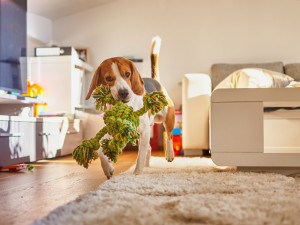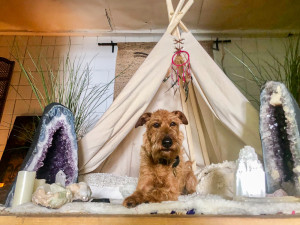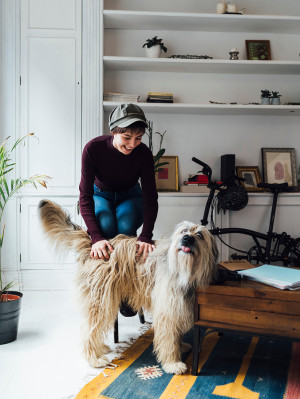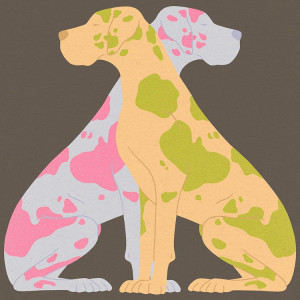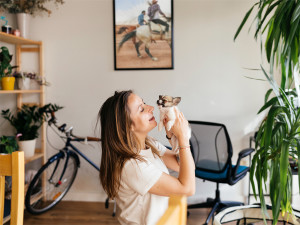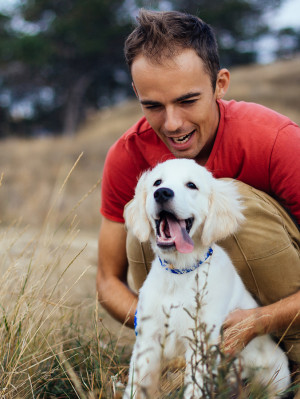Do You Have the Puppy Blues?
Don’t worry: It’s normal to feel sad or anxious after welcoming a new puppy into your life.
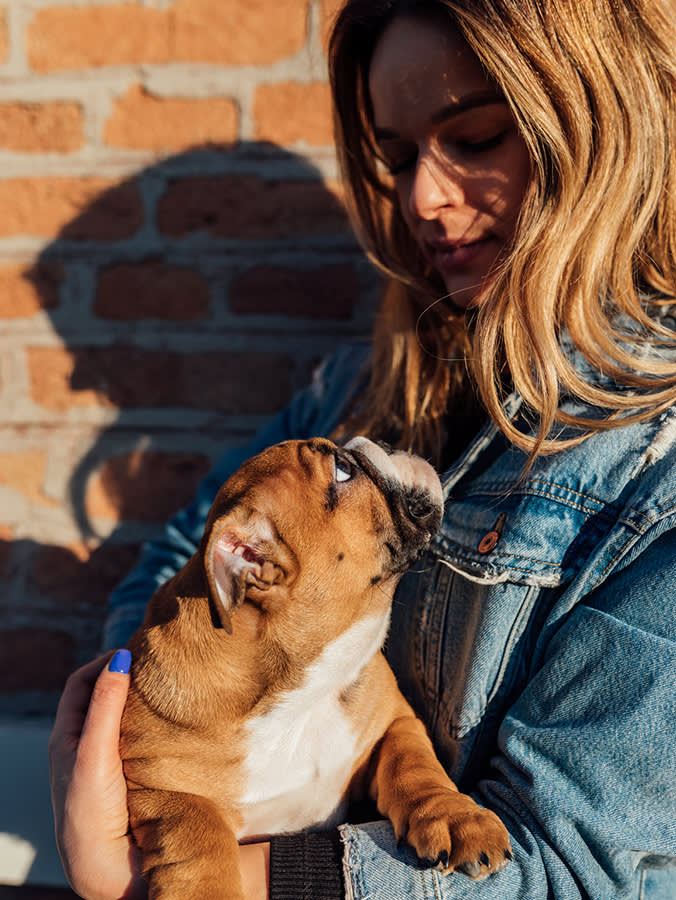
share article
You have adopted a bundle of joy who is (without a doubt) the cutest puppy to ever grace the planet. Maybe you have longed for this new family member forever, or maybe it was a more spontaneous decision. Either way, you imagined a new puppy adding joy to your life and helping you be the happiest you’ve ever been.
So, the melancholy mood that has swept over you has really caught you off guard. It’s not that you don’t love the puppy as much as you expected. They are sweet and playful and cuddly (though sometimes a little destructive or mouthyopens in a new tab and maybe still working on remembering where the bathroom isopens in a new tab) and you feel close to them — at least sometimes. It makes a lot of sense to wonder what in the heck is going on. The answer may be that you have the puppy blues.
What are the puppy blues?
Life with a puppy can be hard. It’s not easy to raise a young dog, and the sacrifices, hard work, and frustration take a heavy toll on our emotions. Even though no one talks about it enough, many people live through a lot of difficult emotions after bringing a puppy into their lives. It’s not unusual to feel anxiety, sadness, or feelings of regret over getting a puppy.
The term “puppy blues” might be a new one for you, but the experience itself is a familiar one to many people. It’s really common, so if you are currently in this predicament, know that you are not alone. It’s also good to know that these feelings have nothing to do with the love you have for your puppy. It doesn’t mean you don’t have a happy future together.
What causes the puppy blues?
There are the people who are overwhelmed in the immediate aftermath of welcoming a puppy into their home — and the people who lie about it. OK, that’s not totally true, but the sentiment is that it’s a lot of work having a puppy in your life, and most of us struggle, to some degree or another, to cope with that. Years ago, my husband and I were fostering a four-month old puppy who was extremely challenging (super high-energy, peed in her crate but not when on a leash, didn’t sleep much, was so obsessed with eating poopopens in a new tab she even tried to eat her own as it was coming out of her body, and, to really top things off, she was always licking everyone’s face — ugh). I had a moment with her that I’m not very proud of. After being outside for a long time trying to get her to pee before going to bed while it was below zero (Wisconsin in February!) I grumbled unhappily to my husband, “Whose idea was it get a puppy?” Obviously, it had been mine, but I just wasn’t feeling like taking the responsibility at that moment. I was struggling, and I know many other people struggle, too.
Logically speaking, it should surprise nobody that the first few months after adopting a new puppy can be emotionally challenging, and yet it does seem to sneak up on so many of us. We expect love to conquer all and the good aspects of having a puppy to make us happy. In truth, there are a lot of tender moments, but the lifestyle can be terrible.
There are many causes of the puppy blues. It’s natural to feel overwhelmed by the workload and the constant attention that you must give to the puppy. There can be an emotional letdown if the puppy experience is not meeting your expectations. Maybe your puppy is not as cuddly as you expected, isn’t progressing as quickly in training as you anticipated, or doesn’t seem as in love with you as you assumed they would be. It’s frequently frustrating to deal with the various nuisance behaviors so common with puppies. Your particular puppy could be prone to puppy biting, scratching, chewingopens in a new tab, destruction, barkingopens in a new tab or some combination of all of them. Add to that the lack of sleep and the missed opportunities to socialize because you have to be home for the puppy, and it’s no wonder you are left feeling sad, anxious, weepy, or melancholy.
What should you do about the puppy blues?
Easing the puppy blues first requires recognizing that you are struggling in this way and accepting that something has to change. Once that is done, it’s time to take action to make the situation better for yourself. Start by coming up with one thing you can do to ease the situation by making it less overwhelming. That might mean giving your pup additional exercise and play time so they rest more and sleep better. Another option is signing up for a puppy classopens in a new tab or for private training sessions. Training sessions tire puppies out, teach you both new skills that lead to a better behaved puppy, offer a fun way for the two of you to interact, and put you in contact with a professional traineropens in a new tab who can answer your questions and help with ideas that make raising your puppy easier.
Another essential way to take care of yourself when you have a new puppy is to make time for you, sans puppy. Make sure to go out with your friends, get outdoors for exercise and fun, spend time doing your favorite hobbies, or whatever else makes you happy and helps you to feel energized. To make this time for yourself may mean you need to ask for help, and you should definitely seek assistance. Whether it’s a friend, relative, neighbor or dog sitteropens in a new tab, arrange for someone else to hang out with the puppy so you can have a break. The constant care of a puppy is exhausting, and it will be best for you and your new best friend if you pace yourself so your emotional energy isn’t depleted.
Remember to prioritize your mental health.
The challenge of attending to the basics of life — working, sleeping, tying your shoes, putting away the groceries, taking a shower — is not a simple matter with a puppy around. It helps to keep your puppy busy in ways that don’t require you to be directly engaged every minute of the day, and there are a lot of ways to do that. Feed your dog with food toys, offer them veterinarian-approved chew items, and train them to be comfortable in a crateopens in a new tab. Your puppy definitely needs a lot of your time, but if they are taking all of it, it’s essential to come up with a plan to change that.
Remember that the puppy blues are usually temporary (these feelings can last anywhere from a few days to a few months) and take solace in the idea that brighter days are ahead. But if you continue to feel bad long after the burdens of early puppy parenting have eased, or you feel extreme despair, unshakeable hopelessness, or an extreme degree of any other negative emotion, consult with a mental health professional. You have to take care of you if you want to take care of a puppy, so take your issues seriously and give yourself the help you need and deserve.

Karen B. London, PhD, CAAB, CPDT-KA
Karen B. London, Ph.D., is a Certified Applied Animal Behaviorist and Certified Professional Dog Trainer who specializes in working with dogs with serious behavioral issues, including aggression, and has also trained other animals including cats, birds, snakes, and insects. She writes the animal column for the Arizona Daily Sun and is an Adjunct Professor in the Department of Biological Sciences at Northern Arizona University. She is the author of six books about training and behavior, including her most recent, Treat Everyone Like a Dog: How a Dog Trainer’s World View Can Improve Your Lifeopens in a new tab.
Related articles
![Valentin Pujadas illustration]() opens in a new tab
opens in a new tabFYI, Pets Are Incredibly Good For Your Mental Health
This Mental Health Awareness Month, experts share the science-backed ways our pets offer us emotional support.
![Happy young female student playing with hairy dog at home]() opens in a new tab
opens in a new tabYou’ve Got Company: How to Cohabitate with a New Dog
Boundaries, right? But if they end up sleeping in bed, that’s cool, too.
![Two colorful Great Danes illustration.]() opens in a new tab
opens in a new tabEver Ask Your Dog “Why Are You Like This?” DNA Is the Answer — Kind Of
This study says it’s actually less about what’s in their DNA and more about what’s on it.
![woman with new puppy]() opens in a new tab
opens in a new tab9 Unexpected To-Dos for New Pet Parents
Sound advice from seasoned dog and cat parents who have been there.
![Two hands holding a very young tan and white puppy up in front of a lake landscape]()
How to Socialize a Puppy
Everything you need to know to get your new addition off to a good start.
![Young Man With Retriever Puppy]() opens in a new tab
opens in a new tabWhen Should You Spay or Neuter Your Dog?
The research is confusing — here are some guidelines.

